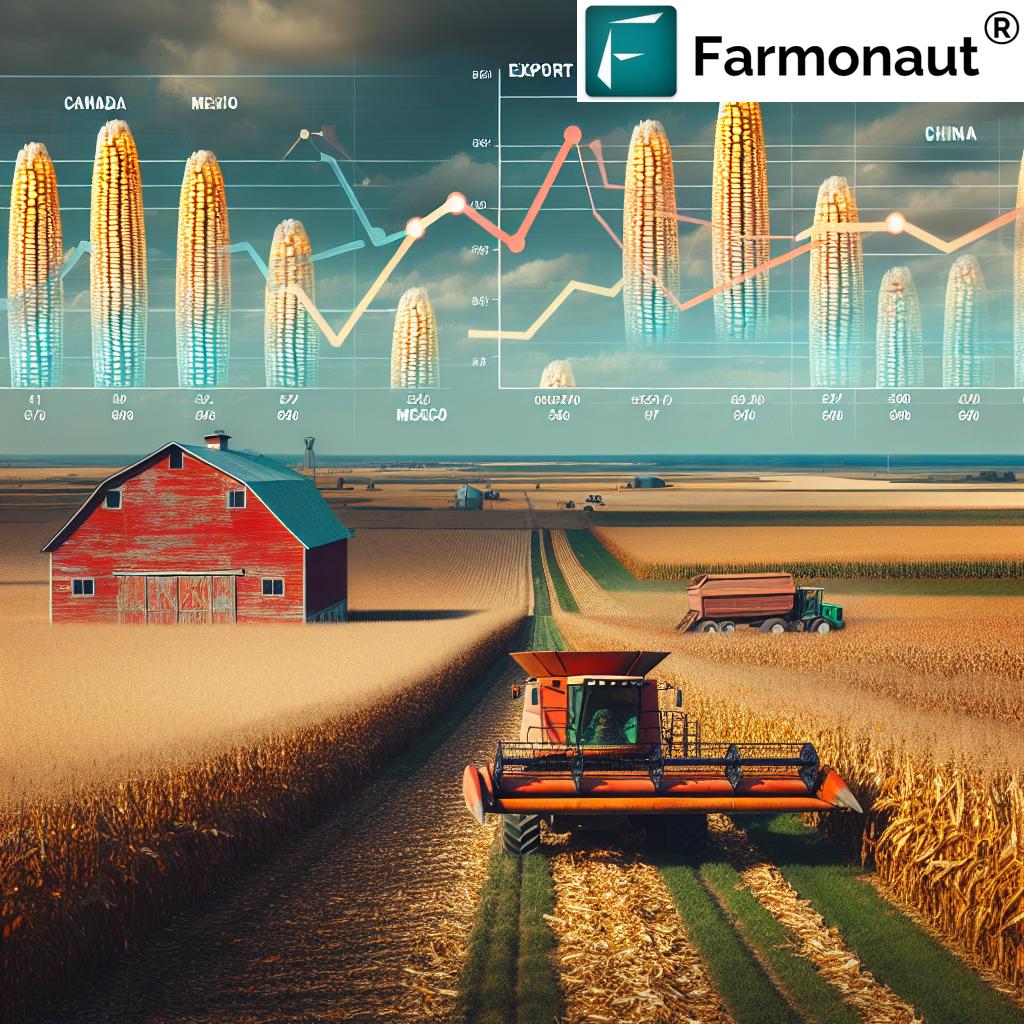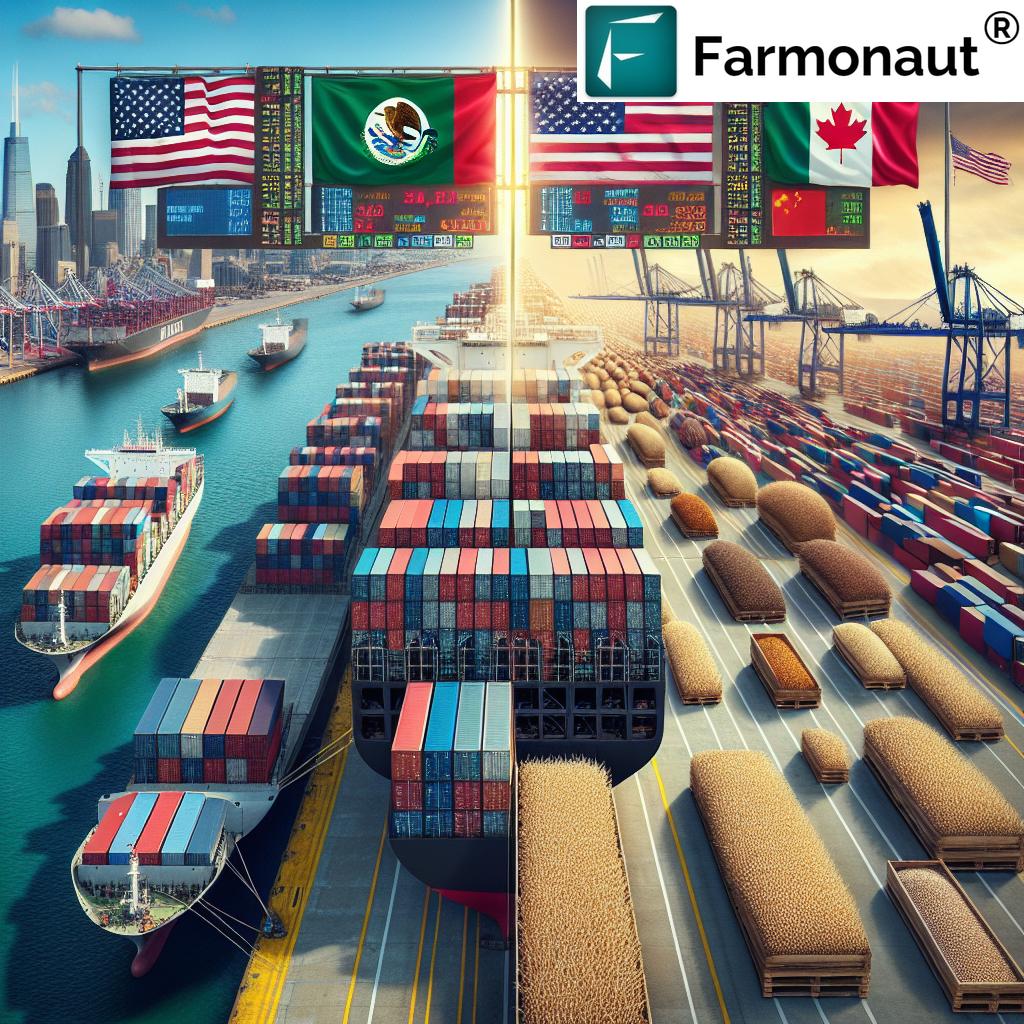Iowa’s Agricultural Dilemma: Navigating Tariffs and Trade Tensions in a Changing Economic Landscape
“Iowa’s agricultural exports, valued at $13.2 billion in 2020, face potential disruption due to new tariffs and trade tensions.”
In the heartland of America, Iowa’s agricultural industry stands at a critical juncture. As we delve into the complexities of international trade and its impact on the Hawkeye State’s farming community, we find ourselves confronting a landscape fraught with uncertainty and potential economic upheaval. The looming specter of new tariffs on imports from Canada and Mexico has cast a long shadow over Iowa’s agricultural exports, prompting concerns from farmers, economists, and policymakers alike.
The Tariff Tangle: Understanding the New Trade Landscape
At the core of this agricultural dilemma lies a proposed set of tariffs that could reshape the economic foundations of Iowa’s farming sector. President Donald Trump’s announcement of a 25% tariff on goods imported from Mexico and Canada, coupled with a 10% tariff on imports from China, has sent ripples through the agricultural community. These measures, ostensibly aimed at addressing issues of migration and drug trafficking, carry with them far-reaching implications for Iowa’s farmers and the broader state economy.
Chad Hart, an esteemed agricultural economist from Iowa State University, has voiced significant concern over the potential for retaliatory measures from Mexico and Canada. These nations represent crucial markets for Iowa’s agricultural exports, particularly soybeans and pork. In 2023, Iowa’s exports to Canada alone amounted to a staggering $5.5 billion, accounting for 30% of the state’s total exports. The gravity of the situation becomes apparent when we consider the combined impact of potential losses from both Mexico and Canada on Iowa’s agricultural sector.

The Political Perspective: Balancing Trade and Security
Iowa’s political leadership has responded to these developments with a mix of caution and support for the administration’s approach. Governor Kim Reynolds has sought to reassure constituents of Trump’s commitment to farmers, pledging ongoing communication with his administration regarding the effects of these trade policies. Reynolds views the tariff strategy as a successful negotiation tactic, citing past instances where countries like Colombia yielded to U.S. demands.
Senator Joni Ernst has echoed this sentiment, framing the tariffs not only as a means to secure better trade deals but also as a crucial tool in combating the fentanyl crisis. Meanwhile, Iowa Economic Development Authority Director Debi Durham draws parallels between current tariff strategies and those employed during Trump’s first term, suggesting they serve primarily as negotiation leverage.
A Closer Look at the Economic Impact
To fully grasp the potential consequences of these tariffs on Iowa’s agricultural sector, let’s examine a detailed breakdown of the state’s major exports and the projected impact of new trade policies.
| Agricultural Product | Annual Export Value (estimated) | Top Export Destinations | Current Tariff Rate | Proposed Tariff Rate | Potential Economic Impact (estimated) |
|---|---|---|---|---|---|
| Corn | $2.5 billion | Mexico, Japan, South Korea | 0-5% | 25% | $625 million loss |
| Soybeans | $3.1 billion | China, Mexico, EU | 0-3% | 25% | $775 million loss |
| Pork | $2.0 billion | Japan, Mexico, Canada | 0-20% | 25% | $500 million loss |
| Beef | $1.8 billion | Japan, South Korea, Canada | 0-25% | 25% | $450 million loss |
This table illustrates the significant economic stakes at play. With potential losses running into hundreds of millions of dollars across key agricultural products, the impact on Iowa’s farming community could be severe and far-reaching.
The Global Context: US-China Trade Tensions
While the focus has been on tariffs affecting trade with Canada and Mexico, it’s crucial to consider the broader context of U.S. trade relations, particularly with China. The ongoing trade tensions between the United States and China have already had a significant impact on Iowa’s agricultural exports, especially soybeans. The proposed 10% tariff on imports from China adds another layer of complexity to an already challenging situation.
The interplay between these various trade disputes creates a complex web of economic relationships that Iowa’s farmers must navigate. As we at Farmonaut analyze these trends, we recognize the need for farmers to have access to cutting-edge tools and information to make informed decisions in this volatile environment.
The Role of Technology in Navigating Trade Challenges
In these uncertain times, agricultural technology plays a crucial role in helping farmers adapt and thrive. Farmonaut’s satellite-based farm management solutions offer real-time insights that can help Iowa’s farmers optimize their operations and make data-driven decisions. Our platform provides valuable services such as:
- Real-time crop health monitoring
- AI-based advisory systems
- Resource management tools
These technologies can help farmers maximize efficiency and productivity, potentially offsetting some of the economic pressures brought about by changing trade dynamics.
The Farmer’s Perspective: Uncertainty and Adaptation
For Iowa’s farmers, the rapidly changing trade landscape presents significant challenges. The uncertainty surrounding future tariff changes makes it difficult to plan for upcoming growing seasons and make long-term investment decisions. Professor Hart from Iowa State University highlights this unpredictability, noting that the quick pace of these developments could lead to chaotic repercussions.
Farmers are being forced to adapt quickly, considering alternative crops, exploring new markets, and implementing cost-saving measures. This is where precision agriculture tools, like those offered by Farmonaut, can provide valuable insights to help farmers make informed decisions in a volatile market.
The Broader Economic Implications
“Economists estimate that retaliatory tariffs could impact up to 25% of Iowa’s agricultural export market, affecting thousands of farmers.”
The impact of these trade tensions extends beyond the farm gate. Iowa’s agricultural industry is deeply interconnected with other sectors of the state’s economy, including manufacturing, transportation, and retail. As such, the ripple effects of agricultural trade disruptions could be felt across the entire state.
Iowa Democratic Party Chair Rita Hart has vocalized concerns about these broader economic implications, arguing that the tariffs could negatively affect manufacturing jobs, inflate consumer prices, and increase taxes for Iowans. This perspective underscores the complex interplay between trade policy and the overall economic health of the state.
Looking Ahead: Strategies for Resilience
As Iowa’s agricultural community faces these challenges, it’s crucial to explore strategies for building resilience and adaptability. Some key approaches include:
- Diversification of crops and markets: Reducing dependence on any single crop or export market can help mitigate risk.
- Adoption of precision agriculture technologies: Tools like Farmonaut’s satellite-based monitoring can help optimize resource use and improve yields.
- Exploration of value-added products: Processing raw agricultural goods into higher-value products can open new market opportunities.
- Engagement in policy discussions: Farmers and industry stakeholders should actively participate in trade policy discussions to ensure their voices are heard.

The Role of Innovation in Agriculture
In challenging times, innovation becomes more critical than ever. Farmonaut’s commitment to making precision agriculture affordable and accessible aligns with the needs of Iowa’s farmers as they navigate this complex trade environment. Our satellite-based solutions and AI-driven insights can help farmers:
- Optimize resource use to reduce costs
- Improve crop yields to maximize profitability
- Make data-driven decisions in response to market changes
By leveraging these technologies, Iowa’s agricultural sector can enhance its competitiveness and resilience in the face of trade uncertainties.
The Importance of Sustainable Practices
As we consider the future of Iowa’s agriculture in this changing trade landscape, it’s crucial to highlight the importance of sustainable farming practices. Sustainability not only ensures long-term viability but can also open up new market opportunities and potentially mitigate some of the impacts of trade disruptions.
Farmonaut’s tools for carbon footprint tracking and efficient resource management can play a vital role in helping Iowa’s farmers adopt more sustainable practices. By reducing environmental impact and improving efficiency, farmers can potentially access new markets and premium prices for sustainably produced goods.
The Global Food Security Perspective
It’s important to consider Iowa’s agricultural challenges within the broader context of global food security. As one of the world’s most productive agricultural regions, disruptions to Iowa’s exports can have far-reaching consequences for food availability and prices worldwide.
This global perspective underscores the importance of finding balanced solutions to trade disputes that consider not only economic factors but also the critical role that Iowa’s agricultural output plays in feeding the world. As we at Farmonaut work to support farmers with cutting-edge technology, we’re acutely aware of the global implications of local agricultural challenges.
The Path Forward: Collaboration and Innovation
As Iowa’s agricultural sector navigates these challenging trade waters, collaboration between farmers, policymakers, researchers, and technology providers will be crucial. By working together, we can develop innovative solutions that help the state’s agricultural industry not just survive but thrive in this new economic landscape.
At Farmonaut, we’re committed to being a part of this collaborative effort, providing farmers with the tools and insights they need to make informed decisions and adapt to changing market conditions. Our API and developer documentation enable integration of our satellite and weather data into various agricultural systems, fostering innovation across the industry.
Conclusion: Resilience in the Face of Change
Iowa’s agricultural dilemma, brought about by changing tariffs and trade tensions, presents significant challenges. However, it also offers opportunities for innovation, adaptation, and growth. As we’ve explored in this analysis, the impact of these trade policies extends far beyond the farm, affecting the entire state’s economy and even global food security.
By embracing technology, adopting sustainable practices, and fostering collaboration, Iowa’s agricultural community can build resilience and navigate these uncertain times. At Farmonaut, we remain committed to supporting farmers with cutting-edge solutions that provide the insights needed to thrive in this evolving landscape.
As we look to the future, it’s clear that the ability to adapt and innovate will be key to the continued success of Iowa’s agricultural sector. With the right tools, strategies, and policies in place, Iowa’s farmers can turn these challenges into opportunities for growth and sustainability.
FAQ: Iowa’s Agricultural Trade Challenges
- Q: How will the proposed tariffs affect Iowa’s farmers?
A: The tariffs could potentially reduce export opportunities and lower prices for key crops like corn and soybeans, impacting farmers’ incomes. - Q: What are Iowa’s main agricultural exports?
A: Iowa’s top agricultural exports include corn, soybeans, pork, and beef. - Q: How can farmers adapt to these trade challenges?
A: Farmers can diversify crops, explore new markets, adopt precision agriculture technologies, and engage in policy discussions. - Q: What role does technology play in addressing these challenges?
A: Technologies like Farmonaut’s satellite-based solutions can help farmers optimize operations, reduce costs, and make data-driven decisions. - Q: How might these trade tensions affect global food security?
A: Disruptions to Iowa’s agricultural exports could potentially impact food availability and prices in countries that rely on these imports.
Earn With Farmonaut: Affiliate Program
Earn 20% recurring commission with Farmonaut’s affiliate program by sharing your promo code and helping farmers save 10%. Onboard 10 Elite farmers monthly to earn a minimum of $148,000 annually—start now and grow your income!




















